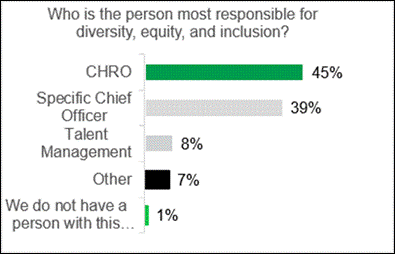Why are DEIB leaders so disengaged?
And how to fix it, according to Gallup’s MD for EMEA!
Expert Insight
DEIB is top of mind for organizations, so why are chief diversity officers so disengaged, according to new data from Gallup?
What's the solution? How can CHROs step up?
Here's the exclusive inside track from Gallup's MD of EMEA Jeremie Brecheisen.
Diversity, Equity, Inclusion, and Belonging (DEIB) remains a key priority for most organizations. However, the future of the Chief Diversity Officer (CDO) or executives in a similar role doesn’t look as promising as it once was.
A recent article in The Wall Street Journal delves into the struggles of senior DEIB leaders as organizations scale back diversity commitments to pursue changing priorities.
According to the article, in 2020, many companies hired CDOs to change their recruitment, hiring, and promotion processes to boost diversity. However, CDOs failed to gain the support of senior leadership to implement their proposed changes.
Unsurprisingly, since 2022 many CDOs have left or moved on to different roles, and those who decided to stay still find it difficult to win the support of their CEO for DEIB initiatives.
However, a Gallup study of Fortune 500 company HR leaders paints a different picture. The study suggests that most companies did not appoint a CDO or dedicated senior DEIB leader. Just over a third (39%) of companies reported having an executive dedicated to DEIB, while less than half (45%) reported that DEIB falls under the Chief HR Officer (CHRO).
So, it seems questionable that companies who hired DEIB leaders are now dropping them purely because most of them never appointed one to begin with.

Credit: Gallup.
Combined with the supposed fall of the DEIB leader, DEIB budgets are also reportedly dwindling.
However, our study shows that this isn’t necessarily the case. In a March 2023 survey, 59% of CHROs said they planned to increase their DEIB budget over the next 12 months. This was down from 84% in 2022, who said they planned to increase their DEIB budget in the next year. While budgets may not be as big as in recent years, most companies plan to increase investment in DEIB initiatives.
How to make the business case for DEIB
So, if it’s not a budget issue, how can the decline of DEIB leaders be explained?
One of the main reasons was the sudden focus on DEIB as a moral and ethical issue rather than a business requirement.
The moral and business cases for DEIB are equally important but in addition to convincing stakeholders that improving DEIB is the right path to take, it is imperative to demonstrate the value it can deliver for businesses.
Showing the positive outcomes of DEIB initiatives on employee engagement, talent retention, collaboration, agility, and productivity will go a long way in securing the support and confidence of key stakeholders.
Our research shows that specific employee experiences are detrimental to engagement, retention, wellbeing, and perceptions of co-workers and the employer organization.
Employees who feel included at work are much more likely to be engaged. For example, employees who strongly agree with the statement, “At work, I am treated with respect” are five times more engaged than those who do not strongly agree with the statement.
Committed, but not engaged
Many DEIB leaders say they do not have the chance to do the work they enjoy and believe is crucial for the well-being of their employees.
Our CHRO Roundtable research shows that most DEIB leaders believe in the mission and purpose of their job and that their work has a positive impact on their mental health.
They also strongly believe that their work is more important than ever, but they aren’t fully convinced that their organisations are making significant headway when it comes to DEIB.
Less than half (46%) of DEIB leaders feel that their organisation had made changes in the past 12 months that improved workplace DEIB, in contrast to CHROs (97%).
So how much time are HR teams dedicating to strategic DEIB issues?
According to our research, DEIB leaders dedicate less than half their time (44%) to strategic issues – dead last among the HR functions – and say that they should be spending 68% of their time on these issues.
Although DEIB leaders remain strongly committed to their role and its mission and purpose, they are the least engaged of the nine HR functions.
Our recent CHRO Roundtable survey placed them in the 42nd percentile of Gallup’s engagement benchmark database. By comparison, Learning & Development (68th percentile) and Talent Management (67th percentile) are substantially more engaged.
How to revive engagement amongst DEIB leaders
It’s a no-brainer that DEIB leaders need to be engaged to ensure the success of DEIB initiatives and achieve the desired change throughout an organization.
Identifying and addressing the reasons behind DEIB leaders’ low engagement is essential to improving the current situation.
There are multiple reasons, but our CHRO Roundtable identified three as the principal factors causing DEIB leaders’ low engagement.
Firstly, they don’t feel well-equipped to do their job effectively. This is closely linked to budgets and material resources that are allocated to DEIB leaders to do their work, but it may also be about access to vital information, internal expertise, or other intangible resources.
CHROs and senior leadership must communicate effectively with their DEIB leaders to better understand the resources they require to do their job.
Secondly, many DEIB leaders don’t feel heard or empowered by HR or senior leadership.
Without their buy-in, it’s extremely challenging for DEIB leaders to feel supported in the work they do.
Finally, they feel that their work is not acknowledged by senior leadership. Many DEIB leaders feel frustrated at the lack of progress their organization is making to meet their DEIB objectives.
To solve this, organizations must acknowledge the smaller wins that, when combined, contribute to achieving their wider objectives.
For example, it might be a matter of introducing new hiring processes that are created to attract more ethnic minority candidates.
Where does DEIB go from here?
There’s a huge misconception around the demise of the DEIB leader that is linked to the notion that every organization had a DEIB leader and then decided to get rid of them. This is simply not the case.
The real reason is their dwindling engagement.
If companies are serious about meeting their DEIB goals they need to engage and support their DEIB leaders.
Sign up to the UNLEASH Newsletter
Get the Editor’s picks of the week delivered straight to your inbox!

Managing Director, EMEA, Gallup
Jeremie Brecheisen leads the Gallup EMEA division as Managing Partner.
Contact Us
"*" indicates required fields
Partner with UNLEASH
"*" indicates required fields